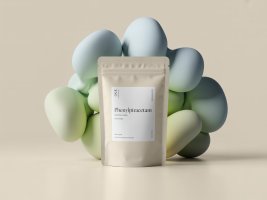
Phenylpiracetam
Phenylpiracetam, also known as Fonturacetam, is a synthetic nootropic compound derived from piracetam, developed in Russia in 1983 primarily for cosmonauts facing high-stress conditions. It acts as a stimulant by inhibiting the reuptake of dopamine and norepinephrine in the brain and also interacts with nicotinic acetylcholine receptors, known for enhancing alertness, focus, and cognitive function. Studies, primarily from Russia and animal models, suggest Phenylpiracetam offers cognitive enhancement, neuroprotection, mood improvement, and increased stress tolerance, often showing greater potency than piracetam.
Table of Contents
Categories & Effectiveness
No categories available for this nootropic.
Dosage & Side Effects
Recommended Dosage
While specific threshold and optimal limits require individual assessment, doses typically align with the available tablet strength, sometimes taken once or twice daily.
Its use is primarily documented in specific patient populations in Russia (e.g., cerebrovascular deficiency, post-brain injury) and cosmonauts; data on variations for other groups is limited.
Potential Side Effects
Less common effects may involve flushing, a feeling of warmth, or increased blood pressure, with potential for anorexic effects during extended use.
Individuals with a known intolerance should avoid it, and caution is advised due to its stimulant properties, particularly regarding blood pressure.
Bioavailability & Half-Life
Interactions & Stacks
Due to its stimulant nature as a dopamine and norepinephrine reuptake inhibitor, caution should be exercised when combining Phenylpiracetam with other stimulants or medications affecting these neurotransmitter systems.
User reports vary, but the stimulant effect is a consistent theme, suggesting careful consideration before stacking.
Benefits by Use Case
Enhanced Alertness & Focus
Acts as a potent stimulant, increasing wakefulness and concentration significantly. Effects typically last for the duration of its half-life, around 3-5 hours.
Cognitive Boost Under Stress
May improve mental performance, memory, and tolerance to stressors like extreme temperatures or demanding tasks. Developed initially for cosmonauts for this purpose.
Combating Fatigue & Apathy
Its dopamine-enhancing effects can increase motivation and reduce feelings of fatigue or apathy, as seen in Russian clinical use and animal studies. Long-term efficacy requires more research.
Neuroprotection & Recovery Support
Used in Russia to aid recovery from conditions like cerebrovascular deficiency or brain injury, potentially by improving blood flow and brain tissue resistance. Evidence mainly from specific patient groups.




